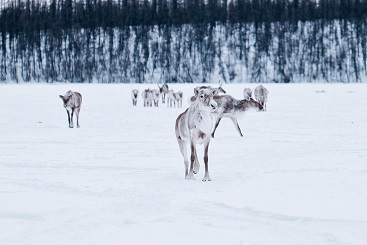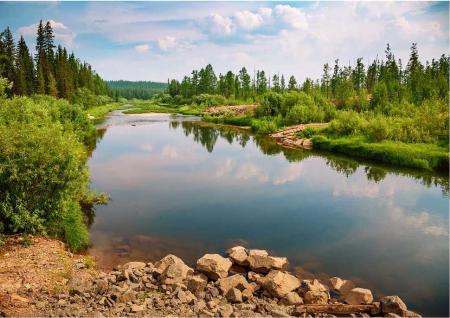 |
- Rosneft's environmental objectives 2035
- Rosneft’s Environmental vision 2035
- Biodiversity conservation
- Managing carbon and combating climate change
Environmental protection is an integral part of Rosneft's corporate culture. The company strives to achieve world leadership in minimizing its environmental footprint. That is why in its operations the company pays close attention to environmental safety, rational use, conservation and restoration of natural resources.
Rosneft's environmental objectives 2035
- minimize environmental footprint through utilizing best available technologies thus increasing the efficiency of waste disposal processes, land reclamation, wastewater treatment and emissions’ reduction;
- implement the "circular economy" principles;
- protect and ensure conservation of the ecosystems and biodiversity.
Rosneft’s Environmental vision 2035
The Vision sets the following environmental development objectives:
- 100% remediation of historically contaminated land;
- 100% processing of historically accumulated oily waste;
- 10% reduction of fresh water consumption by 2030;
- 15% reduction of the total volume of non-GHG emissions;
- 15% reduction of Sulphur Dioxides and Nitrogen Oxides’ emissions.
Biodiversity conservation
 As to biodiversity conservation, the company will take all steps to avoid entry or impacts into Specially Protected Areas and specifically all UNESCO World Heritage Sites and International Union for Conservation of Nature (IUCN) Strict Nature Reserves and Wilderness Areas (IUCN category 1a and 1b) globally as part of planning for new projects.
As to biodiversity conservation, the company will take all steps to avoid entry or impacts into Specially Protected Areas and specifically all UNESCO World Heritage Sites and International Union for Conservation of Nature (IUCN) Strict Nature Reserves and Wilderness Areas (IUCN category 1a and 1b) globally as part of planning for new projects.
All new projects will have inherently environmentally safe designs of new facilities and include ‘no negative ecosystem impact’ to sensitive ecosystems through introduction of best available technologies, monitoring and comparison with scientific baselines.
Future projects will also be based on the principles of ‘net positive’ impact on biodiversity, in alignment with International Union for Conservation of Nature (IUCN) best practice for companies.
 The company pays special attention to preservation of the Arctic marine ecosystems. It has been organizing regular comprehensive studies there since 2012 prioritizing rare and protected species including those on the Red Book of the Russian Federation, regional Red Books and the Red List of the International Union for the Conservation of Nature and Natural Resources (IUCN).
The company pays special attention to preservation of the Arctic marine ecosystems. It has been organizing regular comprehensive studies there since 2012 prioritizing rare and protected species including those on the Red Book of the Russian Federation, regional Red Books and the Red List of the International Union for the Conservation of Nature and Natural Resources (IUCN).
As part of cooperation with the Foundation for support of scientific and project activities of students, postgraduates and young scientists “National Intellectual Resource”, the company publishes environmental atlases of the Russian seas to provide up-to-date comprehensive data on physical geography, oceanology, hydrometeorology, ecology and the history of research related to the Russian seas.
Being a member of the UN Global Compact, the company strives to reduce its environmental impact resulting in climate change as part of achieving the UN Sustainable Development Goals. It identifies and assesses risks and opportunities associated with climate change, and plans for respective adaptation measures.
Managing carbon and combating climate change
Rosneft develops energy outlooks. For strategic planning and development of industry documents, it considers risks and opportunities for the company, the energy sector of the Russian Federation, and the global oil and gas industry related to climate change and transition to low-carbon future. The company has made a number of management decisions to control the prevention of greenhouse gas emissions and carbon footprint of its major production facilities, including the following decisions:
- to increase the level of gas production in the portfolio, as it has a significantly lower carbon footprint compared to other fossil fuels;
- to implement refinery development projects;
- to reduce greenhouse gas emissions, including methane, and improve the energy efficiency;
- to develop and produce new types of products with high fuel efficiency and low greenhouse gas emissions;
- to develop new environmentally focused segments of business.
In 2021, Rosneft’s Board of Directors approved the new strategy “Rosneft-2030: Reliable Energy and Global Energy Transition”. It targets the reduction of the carbon footprint while further improving operational and financial efficiency of the company.
 Rosneft also sets a ”Net Zero” 2050 target (Scope 1 and 2 operational emissions) to be achieved through emissions’ reduction, low-carbon power generation, zero routine flaring, use of energy-saving, carbon capture and storage technologies and natural carbon offsets. The Gas Investment Program, focused on the rational use of APG, and the Energy Saving Program, will mainly leverage GHG reductions.
Rosneft also sets a ”Net Zero” 2050 target (Scope 1 and 2 operational emissions) to be achieved through emissions’ reduction, low-carbon power generation, zero routine flaring, use of energy-saving, carbon capture and storage technologies and natural carbon offsets. The Gas Investment Program, focused on the rational use of APG, and the Energy Saving Program, will mainly leverage GHG reductions.
Carbon Management Committee coordinates the work on achieving the strategic objectives of GHG emissions’ reduction set forth by the company's Carbon Management Plan 2035. In 2021, the company created a Carbon Management Department in charge of development of bilateral and multilateral partnerships for reducing and preventing GHG emissions or enhanced offsetting.
The company's actions to combat climate change contribute to the fulfillment of Russia's commitments under the Paris Agreement.